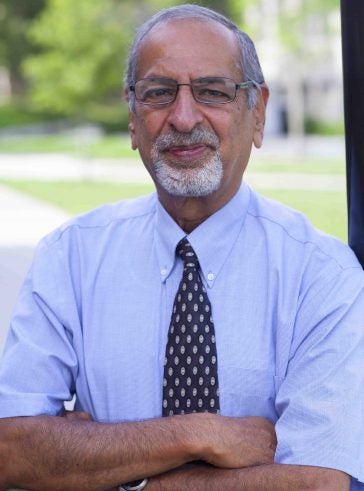
By Neil Nachbar
In the 40 years Arun Shukla has been an engineering professor at the University of Rhode Island, he’s secured more than 100 research grants totaling over $14 million, earned many prestigious awards and has been published in the most prominent journals in his field.
The success of URI’s Simon Ostrach Professor of Mechanical Engineering is also reflected in the impressive achievements of the 105 graduate students he has mentored in his Dynamic Photomechanics Laboratory.
“I’ve always had a close relationship with my students. I stay in touch with almost 99 percent of them,” said Shukla. “That’s what I love about my job. Conducting research is professionally satisfying, but mentoring students and making sure they are successful is very rewarding.”
Building leaders
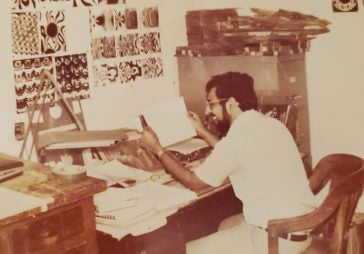
Shukla’s former students have flourished in private industry, academia and governmental positions. According to the professor, the experience they gained in his lab not only prepared them as engineers, but as leaders.
“When they come to work for me, I make sure their technical skills are very strong, but I also improve upon their soft skills,” said Shukla. “Since 1982, I have had my students present their research projects to a group of students and faculty members every Friday. When they make presentations for the first time, they are raw and lack self-confidence. But the more times they present, the more their confidence goes up. That’s why many of them have done so well professionally.”
As an engineering fellow on the mechanical products team for Raytheon Missiles and Defense, a business unit of Raytheon Technologies, Anthony Rafanelli draws upon the engineering background and soft skills he learned under Shukla’s tutelage.
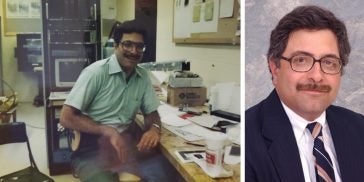
“As my adviser, Dr. Shukla was excellent in helping me address several personal challenges while fulfilling my academic commitments,” said Rafanelli. “He exhibited a phenomenal combination of patience, direction, advice and understanding in helping me reach my academic goals, which has led to a fulfilling career at Raytheon.”
Rafanelli, who lives in Jamestown, is responsible for engaging in project leadership, research and development, and leading engineering review teams to ensure that the design of products and systems comply with customer requirements, as well as engineering process.
Shukla’s students have gone on to leadership positions at companies such as General Electric, Xerox, Goodyear Tire & Rubber Company, SEACORP, KEA Technologies, Inc., and Sensata Technologies.
Inspiring teachers
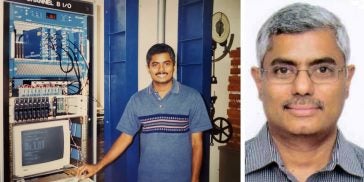
Twelve alumni of Shukla’s lab are faculty members at universities in the United States or abroad, including Brown University, Washington State University, University of Oklahoma, University of Missouri, University of South Carolina, Western New England College, the Indian Institute of Technology in Kanpur and New Delhi, India, and Umm Al-Qura University in Mecca, Saudi Arabia.
Vijaya Chalivendra, who is a professor of solid mechanics at the University of Massachusetts Dartmouth, will take a sabbatical next year so that he can return to URI to work closely with Shukla.
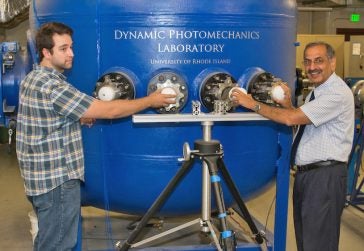
“Professor Shukla’s lab is one of the best experimental mechanics labs in the world,” said Chalivendra. “The sabbatical will enable me to gain knowledge of new tools in his lab and learn how to use these devices to understand the damage sensing and mechanics of novel composite materials under extreme mechanical loads.”
Attracting top students
The Indian Institute of Technology is one of many schools from which Shukla has attracted graduate students over the years.
“As the reputation of our research has grown, we’ve attracted students from some very good universities,” said Shukla. “This year, we have students from the University of Minnesota, Washington State University, the University of Washington and the University of Connecticut. We’ve also attracted international students from the top universities in their countries.”
Each year, two or three of the dozen graduate students who work in the Dynamic Photomechanics Laboratory attended URI as undergraduates.
“We always have a couple of undergraduates who work in the lab alongside the grad students,” said Shukla. “It’s a great way for them to get exposed to high-level research as juniors and seniors and it’s a way for us to attract some of the top students in the mechanical engineering department.”
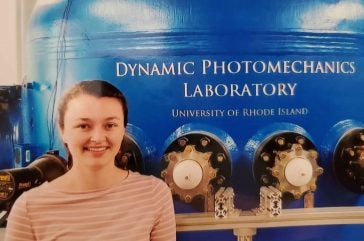
Shukla modestly attributes the reputation of his lab to the accomplishments of his students. The professor estimates that his graduate students have published more than 400 papers, including 250 articles in highly-rated journals.
Chelsea Fox, who completed her master’s degree in mechanical engineering and applied mechanics from URI in May 2021, won first place for best paper in an international competition conducted by the Society for Experimental Mechanics.
The Westerly native is now pursuing her doctorate at the California Institute of Technology, where she will continue to conduct research in solid mechanics and material science.
“I joined Dr. Shukla’s lab after taking a course in experimental mechanics as an undergraduate at URI,” said Fox. “His lab is a great combination of experimental work and theoretical work, which prepared me for Caltech.”
Caltech and Stanford are a couple of the prestigious universities that have collaborated with Shukla on research over the years, making professors at those schools aware of the caliber of students who work under Shukla.
“Several of my students have gone to Caltech for doctorates or for post-doctorate studies and then pursued careers as college professors,” said Shukla.
Awards and recognition
While Shukla is quick to tout the accomplishments of his students, the professor has compiled an extensive list of awards and honors over his distinguished career. Some of them include:
- P.S. Theocaris Award, Society for Experimental Mechanics, 2022
- Satish Dhawan Visiting Chair Professorship, Indian Institute of Science, 2019-20
- Elected Fellow, Society for Shock Wave, India, 2019
- Elected as Foreign Member of Russian Academy of Engineering, 2015
- Elected to European Academy of Sciences and Arts, 2011
- Clark B. Millikan Visiting Professorship, Caltech 2011
- Distinguished Alumnus Award, Indian Institute of Technology, Kanpur, 2009
- Fellow of the American Academy of Mechanics, 2001
- Fellow of the American Society of Mechanical Engineers, 1996
- Fellow of the Society for Experimental Mechanics, 1993
Each honor has elevated Shukla’s reputation in the mechanical engineering community, which has helped him recruit students, establish relationships with peers and secure research grants.
Adapting to emerging trends
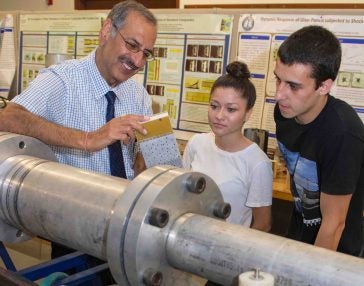
One reason Shukla is considered one of the top people in his field is because he has changed his research focus over the years to reflect current trends in engineering.
“I realized early in my career that if you want to maintain a good stream of funding for your research, which is important because you need the funding to support graduate students, it is important to keep your eyes open and look for areas of research that are emerging,” said Shukla. “I have changed my focus areas five or six times during my career.”
Shukla started his career at URI by working on fracture mechanics, moved onto wave propagation, granular materials, functionally-graded materials, interfacial fracture mechanics, blast mitigation problem, and his current focus is underwater shock response of structures.
“Underwater shock loading is difficult to do,” said Shukla. “We are one of the very few universities in the country that study the dynamic response of structures to underwater shock loads and we use optical methods to study them.”
Every step of the way, the professor’s research has been well-received, with continuous funding coming from the National Science Foundation for 35 years and from the U.S. Navy for the last 20 years, resulting in millions of research dollars.
Partnering with the Navy
While the Navy has provided a large portion of the funding for Shukla’s lab in recent years, the relationship has been mutually beneficial.
“Currently, we’re working on several research projects for the Navy,” said Shukla. “We’re looking at how structures that are deep under water respond to explosive loading or shock loading,” said Shukla. “We’re examining how the coating of materials change in salt water over a period of time, we’re studying how soft materials respond under water and we’re measuring how 3D-printed structures respond to shock loading.”
A new machine in Shukla’s lab is used to study how materials perform under extremely cold conditions. The device can simulate temperatures as low as 40 degrees below zero.
“The Navy is interested in how materials behave in Arctic conditions,” said Shukla.
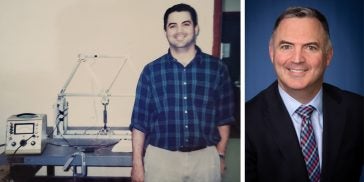
Jason Gomez started working at the Naval Undersea Warfare Center in the early 1990s. After taking a few graduate classes at URI, he joined Shukla’s lab.
“As a young professional in my 20s, he knew exactly when and how to provide the guidance I needed on research projects,” said Gomez, who is from East Greenwich.
Almost 30 years later, Gomez still works closely with Shukla in his role as a chief technology officer at the Naval Undersea Warfare Center Division Newport.
“I continue to have the pleasure of working with Dr. Shukla in my role at NUWC to advance needed research and continue the flow of talented students into our workforce,” said Gomez. “URI is by far the leading source of NUWC engineers and scientists and I would bet a large percentage were influenced by Dr. Shukla or graduated from his lab.”
NUWC in Newport and General Dynamics Electric Boat in North Kingstown and Groton are the largest employers of URI engineering graduates.
In 2018, Shukla became the co-director of the newly-formed National Institute for Undersea Vehicle Technologies, a partnership between the Naval industry, URI and the University of Connecticut. The institute prepares students for successful careers in the defense sector by having them conduct research using innovative technology.
Drawing attention
Shukla’s research has been featured by the national media, including the Today Show and the Discovery Channel. His success has elicited job offers over the years from other universities.
“Most universities are looking for people who are active when it comes to research funding,” said Shukla. “But the University of Rhode Island has treated me very well. URI has been a good place to work, a healthy place to raise a family and my research has been appreciated here.”

